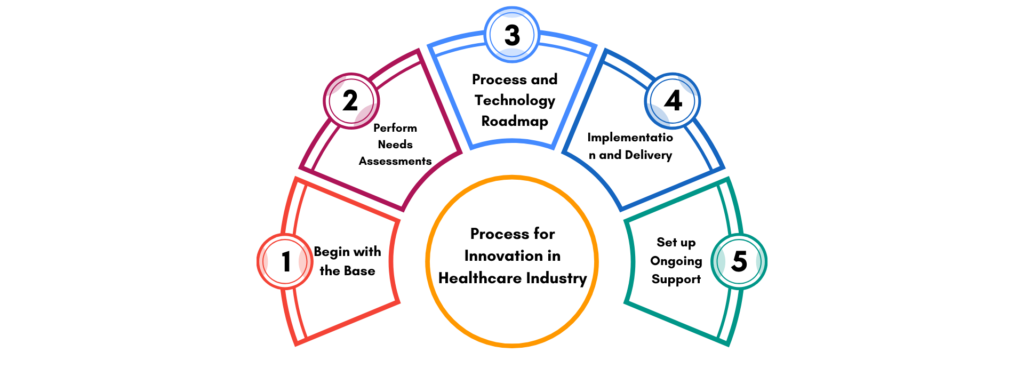How is Digital Transformation Driving Innovation in the Healthcare Industry?
The healthcare industry is experiencing a boost in efficiency and innovation through digital transformation, leading to more effective, cost-conscious, personalized, and patient-centered care. The implementation of advanced technological solutions allows medical institutions to enhance staff experience, improve patient care, lower costs, streamline operational processes, and expedite diagnoses.
Moreover, digital solutions efficiently gather, analyze, and disseminate extensive data, enabling healthcare professionals to recognize patterns and identify anomalies. As a result, medical institutions can formulate innovative strategies and deliver personalized care, cultivating trust and loyalty among patients.
Within this article, we will explore in greater detail how digital transformation in healthcare is reshaping the future of medicine and patient care. We will delve into the evolving healthcare ecosystem, examine the advantages offered by digital transformation solutions in healthcare, analyze the trends that are driving this transformative shift, and scrutinize the potential risks associated with the comprehensive digitization of healthcare.

What is Digital Transformation in Healthcare?
The digital transformation in healthcare involves a range of technologies, empowering medical professionals to utilize modular digital solutions for enhancing patient experiences, drug discovery, operational efficiency, and facilitating more accessible on-demand care.
In the healthcare industry, technological progressions such as electronic health records, online appointment systems, telemedicine, Software as a Medical Device (SaMD), and AI-powered medical devices stand out as notable examples of digitalization.
These technologies transform the way patients interact with healthcare professionals, how their information is shared with providers, and how decisions are made regarding their treatment plans.
How is Digital Transformation Enabling Better Healthcare?
The healthcare sector derives numerous advantages from digital transformation, fundamentally altering the execution of administrative tasks within medical institutions and the delivery of care to patients. A notable advantage of digital transformation in healthcare is the heightened accessibility of medical assistance.
Moreover, the digitalization of healthcare not only enhances efficiency but also streamlines operations and cuts costs. Automation in administrative tasks like appointment scheduling and billing has notably lightened the workload for medical professionals, affording them more time to concentrate on patient care.
Predictably, prioritizing the digitization of the healthcare sector has become the foremost goal for healthcare leaders as they strive to establish resilient and future-ready healthcare systems.
Non-communicable diseases are on the Rise
The mounting burden of chronic diseases or non-communicable diseases (NCDs) is exerting escalating pressure on healthcare systems globally. As per the World Health Organization (WHO), NCDs presently stand as the predominant cause of adult mortality across the world, claiming approximately 41 million lives annually—comprising a staggering 74% of total global deaths. Projections indicate a future escalation in these numbers, driven by the ongoing aging of populations.
Hence, to ensure the sustainability of healthcare systems, there is a pressing requirement to implement digital transformation solutions. These solutions play a crucial role in rapidly and efficiently detecting and treating diseases, simultaneously averting the onset of chronic illnesses in individuals.
Patients Expect More Personalized Care
With the global expansion of access to information and technology, there has been a substantial rise in patients’ expectations from healthcare institutions. They now anticipate care that is not only more personalized but also highly convenient.
The pandemic has contributed to a substantial shift in these expectations. For instance, based on a McKinsey survey, approximately 40% of consumers expressed their intention to persist in using telehealth services in the future, a notable increase from the 11% reported before the onset of COVID-19.
Medical Institutions Face Staff Shortage
In response to the continually growing need for accessible and continuous healthcare, medical institutions encounter shortages of staff in numerous regions worldwide. According to the World Health Organization (WHO), it is projected that by 2030, there will be a shortfall of 10 million skilled healthcare professionals on a global scale.
As outlined in a Qatar Foundation report in partnership with WHO, WISH, during the COVID-19 pandemic, 23 to 46% of healthcare workers disclosed experiencing mental burnout, while 20 to 37% reported depressive symptoms.
Consequently, safeguarding the mental and physical well-being of healthcare professionals has taken on heightened significance. The digital transformation of healthcare emerges as a solution to streamline workflows and automate routine tasks, diminishing the reliance on human resources and alleviating the increasing burden on healthcare workers.
The Five-Step Process for Innovation in Healthcare Industry
In the dynamic landscape of digital transformation in healthcare sector, there is an immediate call to instigate constructive change and tackle intricate challenges strategically to adopt innovation effectively. Presented here is a five-step process to cultivate innovation in the healthcare industry. Adhering to these steps enables medical institutions to adeptly navigate the complexities of healthcare innovation, leading to groundbreaking advancements. Consequently, hospitals can enhance their clinical capabilities, optimize processes, elevate patient outcomes, and reshape the delivery of healthcare digital transformation services.

Begin with the Base
Examine your existing resources, including legacy systems, real-time location systems, patient engagement software, electronic health records (EHR), telemetry, and so forth. Once you have gathered this information, evaluate the effectiveness of each component and identify areas that could be enhanced.
Perform Needs Assessments
After acquiring all the necessary information, involve the design team in prioritizing the wish lists for each department, taking the allocated budget into account. Subsequently, consider crucial metrics such as HCAHPS scores, return on investment (ROI), and satisfaction levels of both patients and staff regarding safety. Finally, develop strategies to utilize technologies in achieving these key performance indicators.
Establish the Process and Technology Roadmap
Proceed to develop the design for the process and technology mapping, identifying areas that can be resolved and those that should be incorporated into technology. Subsequently, advance with an integrated delivery approach, addressing essential questions such as project ownership and responsibilities for the integration or modernization of legacy healthcare applications.
Implementation and Delivery
To ensure a successful execution and delivery of the process, collaborate with a reputable healthcare digital transformation company. The chosen IT consulting firm should demonstrate extensive expertise in intricate aspects, monitor project advancements, work towards realizing a shared vision, and guarantee the fulfillment of key performance indicators. Additionally, the selected agency for healthcare consulting services should exhibit core competency in addressing both current challenges and those anticipated in the future.
Set up Ongoing Support
The concluding step involves establishing a system for continuous support to facilitate the seamless digitalization of healthcare. Your healthcare digital transformation provider should furnish the necessary knowledge and expertise to overcome any obstacles that may arise during the digitalization journey.
Real-World Examples and Use Cases of Digital Healthcare Solutions
The primary objective of trends in digital transformation in healthcare is the adoption of inventive solutions spanning different areas, aiming to streamline operational processes, enhance compliance, manage patient health effectively, and reduce costs. To gain a deeper understanding of how digital transformation enhances efficiency in the sector, let’s explore noteworthy use cases and real-world examples of digital solutions in healthcare.
Patient Portals
Another significant application of digital healthcare solutions, patient portals enable individuals to access their health records, verify prescriptions, schedule appointments with healthcare professionals, and perform additional functions. According to a survey, 82% of healthcare providers identify patient portals as one of their key technologies for patient engagement.
This trend advocates for swifter and more convenient access to electronic health records, thereby considerably alleviating the workload on medical staff. Patients also can share their data with multiple providers, eliminating the necessity to make calls and manually transfer records.
Data Aggregation
In addition to patient portals facilitating the retrieval of patient data, numerous hospitals focus on aggregating back-end data. Presently, clinics and hospitals collect data from diverse sources, including electronic health records, lab results, insurance claims, medical devices, imaging, and more. The abundance of these sources poses a potential risk of overlooking critical patient medical history information.
Through data aggregation, healthcare providers can make prompt and well-informed decisions regarding patient care without the concern of overlooking vital information. Essentially, this digital healthcare innovation improves patient care while simultaneously lowering costs.
As an example, Mayo Clinic employs the data aggregation approach in collaboration with Google, leveraging cloud solutions for centralized data storage and analytics.
Analysis of Medical History for Disease Insights
Presently, various tools aid in examining a patient’s medical history to provide physicians with recommendations on potential treatment outcomes. BostonGene, for instance, exemplifies such a solution, conducting in-depth analyses of a patient’s past conditions and presenting a personalized treatment plan that holds the potential for optimal results.
Prominent Digital Transformation Trends in Healthcare
The impetus behind the digital transformation in healthcare is driven by technological advancements and innovation. Digital technologies are reshaping the future of the healthcare industry, revolutionizing the practice of medicine. They have significantly enhanced operational efficiency in alignment with medical guidelines, fundamentally transforming the overall experience for healthcare providers and patients alike. Below are some prevalent trends in healthcare digital transformation that are steadily revolutionizing both digital health startups and established institutions.
On-Demand Healthcare
The realm of healthcare mobile app development is entering a new phase of digital innovation as patients increasingly rely on their smartphones for on-demand healthcare access. This trend is not only user-centric; companies like Nomad Health are empowering their physicians to provide on-demand healthcare services to patients based on their expertise and availability.
Virtual Reality-Based Therapy
Virtual reality has seamlessly integrated into the fabric of the digital healthcare landscape, proving to be successful in treating individuals experiencing chronic pain, particularly in regions grappling with the challenges of the drug crisis. Beyond chronic pain, this technology is employed for the treatment of conditions such as PTSD, stress, and stroke. Both residents and medical professionals have adopted the use of VR simulations to enhance skills or strategize for complex surgeries. Across the board, there is a collective belief in the potential of virtual reality to enhance medical care and treatments, contributing to the projected growth of the global AR/VR market, set to reach $9.5 billion by 2028.
Healthcare IoT
Despite historical hesitancy in embracing IoT within the healthcare sector, the adoption of medical IoT is progressing swiftly as part of the broader digital transformation in healthcare. The integration of medical IoT devices and solutions plays a crucial role in advancing the overarching goals of digital transformation in healthcare. From straightforward tracking solutions to intricate automation, the use cases of medical IoT contribute to the foundational pillars of a smart hospital, with a focus on clinical excellence, patient-centric care, and operational efficiency.
Telehealth
The landscape of patient interactions with healthcare providers is undergoing a significant transformation through telehealth. Key technologies within telehealth, such as telemedicine, mobile health (mHealth) apps, video conferencing, and remote patient monitoring, have had a profound impact. The adoption of telehealth surged during the pandemic, as it proved instrumental in reducing unnecessary physical contact while empowering patients to manage their conditions. Additionally, telehealth can be integrated with IoT devices and wearables to efficiently monitor high-risk patients through the tracking of their activity data.
Challenges of Digital Transformation in Healthcare
The extensive integration of digital transformation use cases in the healthcare industry also presents notable challenges that require effective addressing. Here are the primary challenges to consider when undertaking digital transformation in healthcare.

Privacy of Data
As the industry transitions to digital systems and electronic health records, the incidence of data breaches and cyber theft risks has heightened. In the absence of sufficient data privacy controls, the healthcare industry faces substantial concerns regarding the potential loss of data.
Resource and Infrastructure Constraints
Certain healthcare facilities may find themselves lacking the essential resources to adopt digital transformation in healthcare, including funding, a proficient workforce, and IT infrastructure.
Resistance to Change In numerous cases, healthcare professionals exhibit resistance to adopting new technologies and embracing change, highlighting the need for effective management strategies to encourage the acceptance of innovation and utilization.
Distributed Workforce
The advent of telemedicine technology trends has brought dynamism and distribution to the healthcare domain. This essential shift in digital health strategies introduces the potential risks of unauthorized access and inadequate worker authentication. The situation can escalate when there is a lack of architecture to connect healthcare providers with their distributed patients.
How Digiatto IT Services Can Support Your Digital Transformation Journey
As a prominent healthcare software development company, we have crafted numerous scalable digital solutions in healthcare, meticulously tailored to meet the unique requirements of each client. Our adept team of developers is well-versed in the latest technologies, including AI, ML, IoT, Blockchain, cloud computing, and more, enabling us to deliver unparalleled digital transformation services to address all healthcare needs.
Having collaborated with various healthcare companies, we have played a pivotal role in helping them embrace digital innovations, leading to improved revenue, cost reduction, and an enhanced customer experience.
For example, our collaboration with YouCOMM resulted in the creation of a multi-request platform for in-hospital patients, facilitating real-time connections with nurses for medical assistance. This system allows patients to alert staff through voice commands and head gestures. YouCOMM has been successfully adopted by multiple hospital chains in the US, demonstrating its efficacy and value.
Another notable partnership is with Health-eApp, where we developed a platform enabling users to store healthcare apps and devices’ data and connect with medical caregivers for their friends and family. Our focus was on creating a user-friendly application benefiting users, researchers, and medical caregivers alike.
These instances provide just a glimpse of how we assist our clients in their healthcare digital transformation journey. For a comprehensive overview, explore our portfolio or engage with our experts to understand how we can provide exceptional healthcare digital transformation consulting and other services tailored to your needs.
These examples offer a glimpse into how we support our clients on their healthcare digital transformation journey. For a more in-depth understanding, explore our portfolio or reach out to our experts to discover how we can assist you through outstanding healthcare digital transformation consulting and other services.



Pingback: Role of Cloud Computing in Healthcare Industry - Health SaaS Pro
Pingback: How can your Healthcare System lead in Digital Health? - Health SaaS Pro
Pingback: Legacy Application Modernization Strategy - Tech Startup
Pingback: A Complete Guide to Healthcare Compliances - HealthSaaSPro
Pingback: Legacy Systems in Healthcare - HealthSaaSPro
Pingback: Business Guide to Healthcare Application Development in 2024 - HealthSaaSPro
Pingback: Building a custom Laboratory Information Management Software - HealthSaaSPro
Pingback: Transform Your Healthcare Business with Digital Payments - HealthSaaSPro
Pingback: Why does your healthcare organisation need an ERP solution? - HealthSaaSPro
Pingback: Healthcare Business Intelligence is Improving Patient Care - HealthSaaSPro
Pingback: AI in Healthcare: Transforming the Industry - HealthSaaSPro